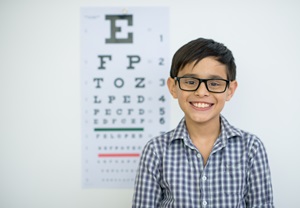Annual Eye Exams
Going to an eye doctor is just as important as going to your primary care doctor
During a comprehensive eye exam, your eye doctor does much more than just determine your prescription for eyeglasses or contact lenses. He or she will also check your eyes for common eye diseases, assess how your eyes work together as a team and evaluate your eyes as an indicator of your overall health.
The most common eye condition is refractive error (the need to correct the vision of the eye with glasses). The three most common refractive errors are myopia (nearsightedness), hyperopia (farsightedness) and astigmatism (an uneven curvature of the cornea that causes a distortion in vision).
Presbyopia, which is the age-related loss of accommodation (resulting in the need for bifocals), starts between the ages of 38-45 years, and affects virtually 100% of the population by around 50 years. Cataracts (loss of clarity of the lens inside the eye) is estimated to affect 42% of individuals between the ages of 52-64 years. However, only about 5% of these people suffer significant loss of vision. Nearly everyone develops some degree of cataracts by age 75-85 years. Cataracts, if caught early are surgically removed, generally as an outpatient with outstanding results.
Kid's Eye Exams
Annual eye exams are as important as visits to the pediatricians. Kid’s eyes need to be examined for proper development to ensure healthy eyesight for life. We recommend the following schedule for eye exams for kids. 
6 Months - 2 Years
The American Optometric Association recommends that a child’s first eye exam be conducted at the age of six months to a year. Excessive refractive error, inadequate eye movements, and ocular health can limit a child’s ability to develop normal vision. A complete vision and health exam will catch these problems early on, when treatment is most effective.
Toddlers (2 - 4)
The next eye exam in a child’s life should be conducted around three years of age. At this time, the child is able to verbalize what they are seeing, even if they haven’t learned the alphabet yet. This exam will assure the child is ready for the high visual demands that come with the first year of school.
Children in School
As a child grows, their eye grows as well. The visual tasks required of a child increase with each grade. Because of this, it is important for children to have a comprehensive eye exam every year to assure they are ready to meet the demands of the next grade
